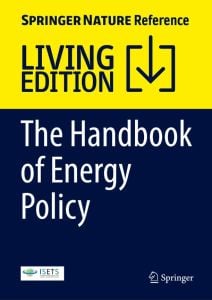

Author(s):
Summary:
The Handbook of Energy Policy is a unique and novel reference for addressing the policy implications of energy demand and supply from their economic, political, social, planning, and environmental aspects. The Handbook of Energy Policy provides several studies from the global, regional, national, or local perspectives that are of wider policy significance. Studies provided in this book are of interest to the international organizations, governments, public and private sector entities, local communities, universities, research institutions, and other non-governmental organizations.
Topics covered in the Handbook of Energy Policy are including:
- energy security
- energy poverty
- energy finance
- energy pricing
- energy and environment
- energy and sustainability
- energy and growth
- energy efficiency
- energy trade
- technological innovation and energy
- energy transition
- energy nexus studies
- economics, and policy of fossil fuels
- economics,policy of renewable and green energies
The policy recommendations provided in all chapters are supported by a rigorous empirical or theoretical analysis.
Gianfranco Gianfrate, Research Director at EDHEC-Risk Climate Impact Institute contributed to the book with the chapter: Technology Diversification in Renewable Mini-Grid Portfolios.
More than 90% of the world population has access to electricity in 2018, but many rural areas are still lagging. Mini grids can help electrifying isolated regions and rural areas before a structural widening of national grid systems becomes viable. Capital from private investors is key to scale up the development of mini grids. However, unattractive risk-return profiles, small investment tickets, and lack of adequate financing instruments are stalling the necessary investments. Aggregating mini-grid projects could attract more private financing by making the investment ticket more palatable, and by reducing the risk and therefore the cost of capital. In this chapter, the authors explore whether technological diversification in mini-grids portfolios can improve the risk-return profiles for investors. They apply a Markowitz portfolio optimization approach and show that, given certain conditions, technological diversification can improve the risk-return profile of mini-grid portfolios, thus making the investments more attractive to potential funders. Policymaking should address the conditions that facilitate diversification allowing the enhancement of risk-adjusted investment returns.
Keywords: Energy decentralization, Mini grids, Rural electrification, Renewable policy, Portfolio optimization, Risk-adjusted returns
| Type : | Book |
|---|---|
| Date : | 05/01/2023 |
| Editor : | Springer Singapore |

